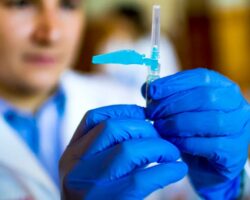NIH dispatches preliminaries for long-Coronavirus medicines: what researchers believe

Yesterday, the US National Institutes of Health (NIH) announced that it will launch its first trials to evaluate the safety and effectiveness of long-term COVID treatments. These preliminaries will zero in on treatments focused on probably the most weakening side effects of the sickness, including cerebrum haze and upset rest.
The NIH’s nearly $1.2 billion RECOVER initiative has been the subject of criticism from researchers and people with COVID for two years regarding its direction and effectiveness. They say that the organization has moved too leisurely to select individuals in examinations and begin testing possible medicines for the condition, which influences an expected 65 million individuals all over the planet.
In response to this criticism, Kanecia Zimmerman, a clinician at Duke University School of Medicine in Durham, North Carolina, who is assisting in the coordination of the RECOVER studies, stated yesterday at a press briefing that launching a clinical trial involves a number of steps, including drafting study protocols, consulting with specialists and individuals who have the disease, and obtaining approval from authorities.
Specialists who addressed Nature say that starting treatment preliminaries is a critical stage, yet that it will take substantial advancement in these preliminaries to guarantee those impacted that US wellbeing authorities are viewing their interests in a serious way. ” The reality there were no preliminaries until this point has been exceptionally deterring,” says Eric Topol, chief VP at Scripps Exploration in La Jolla, California. ” The people group of individuals enduring are frantic and need to see the venture by NIH prove to be fruitful.”
A group of stars of side effects
As per its declaration, the NIH has proactively sent off one stage II preliminary and will send off one more three before very long. These will test whether different medicines can decrease how much time that the SARS-CoV-2 Covid waits in the body, ease mental side effects, for example, cerebrum haze and cognitive decline, further develop rest quality and alertness, and reorient the autonomic sensory system, which directs fundamentalphysical processes like heartbeat. Each of the potential treatments will be administered to 100 to 300 participants in the trials.
High stakes exist: At the press conference, the director of the National Institute of Neurological Disorders and Stroke (NIH), Walter Koroshetz, stated that this is the world’s largest comprehensive study of long COVID. More modest preliminaries have been sent off around the world, yet few are reading up numerous medicines for the heavenly body of side effects that characterize long Coronavirus.
Paxlovid, an antiviral manufactured by New York City-based pharmaceutical company Pfizer, will be evaluated in the first of the RECOVER treatment trials, which has already begun enrolling participants. People who have acute COVID-19 are typically given Paxlovid pills for five days. Some exploration has found, however, that the infection can keep on causing side effects and persevere in the body for a really long time after treatment1. So the Recuperate preliminary expects to realize whether a more extended, 15-or 25-day routine can lighten long-Coronavirus side effects.
Two online training programs and a home-based brain-stimulation device will be put through their paces in the upcoming brain fog trial. According to neuropsychologist Jim Jackson, who works at Vanderbilt University Medical Center in Nashville, Tennessee, “I’m encouraged by the comprehensiveness of the approach.” He adds that if the treatments are found to be safe and effective, they could be easily scaled up and performed at home, which would make them more accessible.
Two additional preliminaries will send off in no time, Zimmerman said. The one on rest will assess the impacts of alertness advancing medications solriamfetol and modafinil, as well as those of light treatment, supplementation with the rest instigating chemical melatonin and training on the most proficient method to get great rest. The preliminary focused on the autonomic sensory system will test ivabradine, used to treat constant cardiovascular breakdown, and a resistant supporting intravenous counter acting agent treatment.
Authorities have deferred a fifth preliminary zeroed in on the weariness that individuals with long Coronavirus experience after work out. Those who are concerned that putting some participants through exercise trials might be harmful have scrutinized the trial’s protocols closely. According to Zimmerman, the NIH is “actively engaging” specialists and individuals with long-term COVID in order to decide how to proceed with this trial.
Slow progress According to Ezekiel Emanuel, a bioethicist and oncologist at the University of Pennsylvania in Philadelphia, it is wonderful that some of these trials have been launched by the NIH; however, he is keeping an eye on whether or not they will enroll the intended number of patients. Up until this point, the organization has enrolled just 24,000 members — well underneath its objective of 40,000 toward the finish of last year, he says. Topol says this may be on the grounds that the organization has generally depended on customary, as opposed to computerized, conventions that require individuals with long Coronavirus to join preliminaries face to face — a troublesome suggestion, given the weakening idea of the condition.
A cognitive neurologist at Weill Cornell Medicine in New York City, Anna Nordvig, expresses gratitude for the US government’s commitment to follow through. In spite of the fact that we as a whole wished and trusted this would come quicker, this must be a profoundly organized approach,” she says.
Officials also said that the US government is officially establishing the Office of Long COVID Research and Practice, which will coordinate research efforts, when they announced the trials’ start. The workplace, proposed a year prior, will be housed inside the Branch of Wellbeing and Human Administrations. In the first place, it will have just two full-time workers inferable from restricted subsidizing, Michael Iademarco, delegate collaborator secretary for science and medication at the Workplace of the Associate Secretary of Wellbeing, said at the preparation.
Financing for long Coronavirus examination could be rare in future, as well. Lawrence Tabak, acting NIH director, stated at the briefing that while the phase II RECOVER trials will be funded to completion, the status of financing for subsequent trials remains unknown. Since US President Joe Biden’s organization announced the finish of the Coronavirus crisis in May, Congress has shown little craving for putting further in Coronavirus.
The finish of the pandemic crisis has prompted “huge dissatisfaction” among individuals with long Coronavirus and an inclination that they have been “totally deserted”, Jackson says. In any case, he adds that these preliminaries can possibly reverse the situation: ” There is no question this is the thing patients have been clamoring for.”


